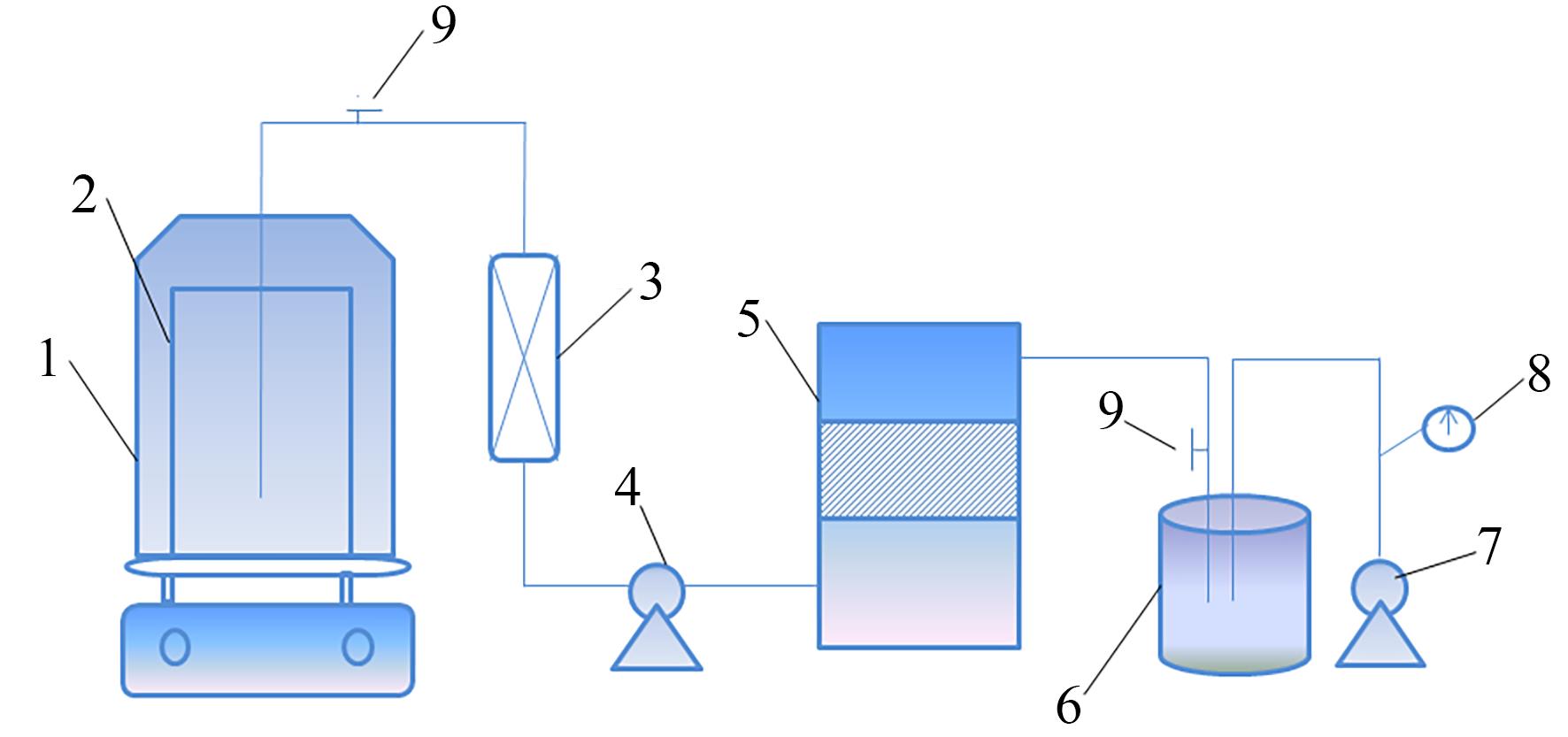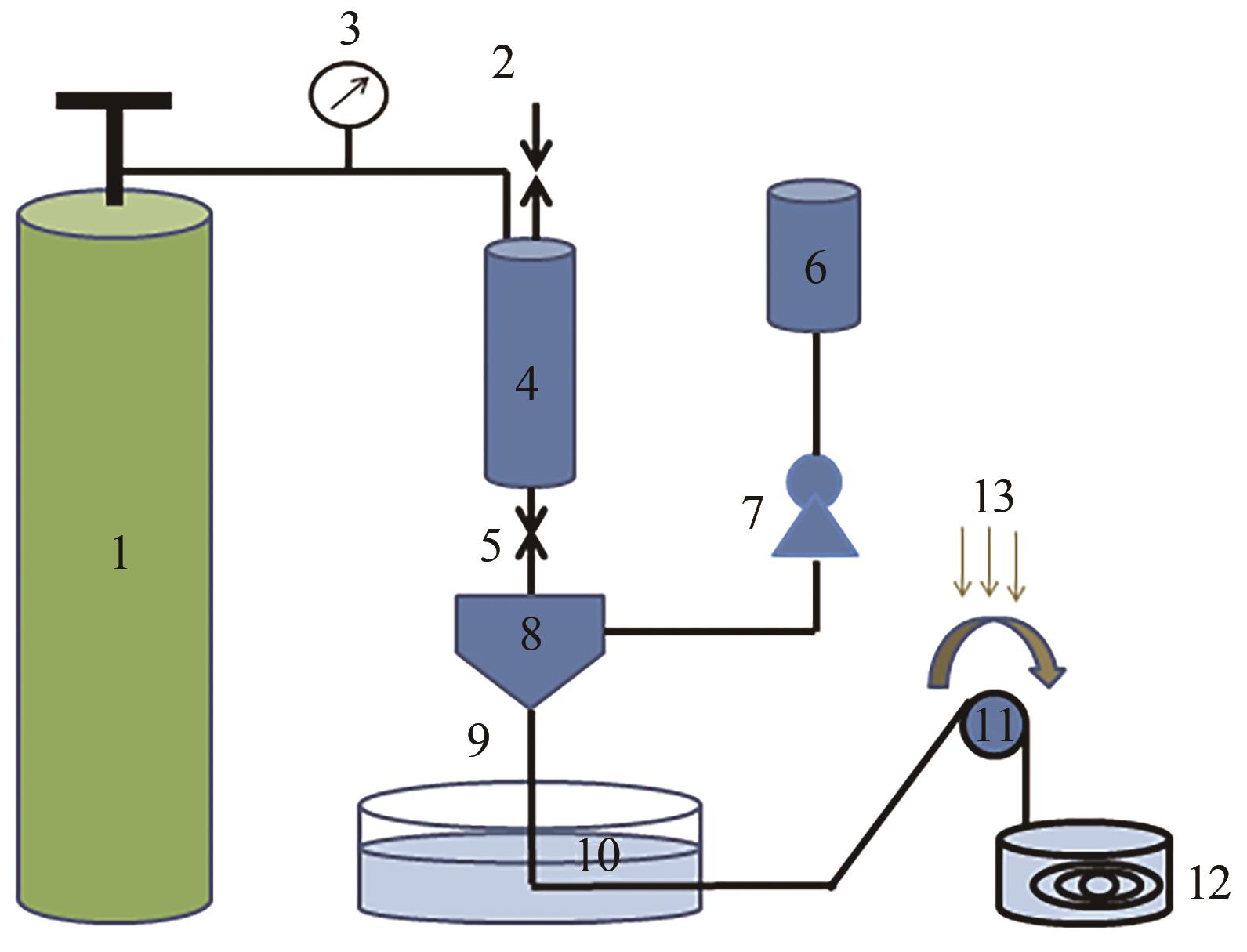| 1 |
刘燕青. 填充改性PDMS渗透汽化膜的制备及其酯/水分离性能的研究[D]. 南宁: 广西大学, 2019.
|
|
LIU Yanqing. Preparation of filled modified PDMS pervaporation membrane and separation performance for ester/water[D]. Nanning: Guangxi University, 2019.
|
| 2 |
ANG M B M Y, MARQUEZ J A D, HUANG S H, et al. A recent review of developmental trends in fabricating pervaporation membranes through interfacial polymerization and future prospects[J]. Journal of Industrial and Engineering Chemistry, 2021, 97: 129-141.
|
| 3 |
ONG Y K, SHI G M, LE N L, et al. Recent membrane development for pervaporation processes[J]. Progress in Polymer Science, 2016, 57: 1-31.
|
| 4 |
林源. 渗透汽化分离膜的制备与应用研究进展[J]. 南京工业大学学报(自然科学版), 2020, 42(6): 700-709.
|
|
LIN Yuan. Advances of preparation and application of pervaporation separation membrane[J]. Journal of Nanjing Tech University (Natural Science Edition), 2020, 42(6): 700-709.
|
| 5 |
龚彦文, 程雪妮, 杜雪丽. 羧甲基壳聚糖-聚乙烯醇渗透汽化膜分离乙醇-水的性能[J]. 化学工程师, 2011, 25(8): 13-15.
|
|
GONG Yanwen, CHENG Xueni, DU Xueli. Separation of ethanol-water by pervaporation on carboxymethyl chitosan-polyvinyl alcohol membrane[J]. Chemical Engineer, 2011, 25(8): 13-15.
|
| 6 |
WANG H Y, LI C C, XU Q, et al. Mass transport and pervaporation recovery of aniline with high-purity from dilute aqueous solution by PEBA/PVDF composite membranes[J]. Separation and Purification Technology, 2021, 268: 118708.
|
| 7 |
XUE C, DU G Q, CHEN L J, et al. Evaluation of asymmetric polydimethylsiloxane-polyvinylidene fluoride composite membrane and incorporated with acetone-butanol-ethanol fermentation for butanol recovery[J]. Journal of Biotechnology, 2014, 188: 158-165.
|
| 8 |
KHAN R, UL HAQ I, MAO H, et al. Enhancing the pervaporation performance of PEBA/PVDF membrane by incorporating MAF-6 for the separation of phenol from its aqueous solution[J]. Separation and Purification Technology, 2021, 256: 117804.
|
| 9 |
PRASAD C V, YERISWAMY B, SUDHAKAR H, et al. Preparation and characterization of nanoparticle-filled, mixed-matrix membranes for the pervaporation dehydration of isopropyl alcohol[J]. Journal of Applied Polymer Science, 2012, 125(5): 3351-3360.
|
| 10 |
张所波, 张奇峰, 李胜海. 反渗透复合膜最新研究进展[J]. 膜科学与技术, 2013, 33(4): 1-6.
|
|
ZHANG Suobo, ZHANG Qifeng, LI Shenghai. Progress on thin-film composite(TFC) reverse osmosis membrane[J]. Membrane Science and Technology, 2013, 33(4): 1-6.
|
| 11 |
蒋超, 马文中, 李太雨, 等. 界面聚合法合成聚酰亚胺渗透汽化膜及表征[J]. 高校化学工程学报, 2019, 33(3): 724-731.
|
|
JIANG Chao, MA Wenzhong, LI Taiyu, et al. Preparation and characterization of polyimide pervaporation membranes via interfacial polymerization[J]. Journal of Chemical Engineering of Chinese Universities, 2019, 33(3): 724-731.
|
| 12 |
CHENG C, LI P Y, SHEN K, et al. Integrated polyamide thin-film nanofibrous composite membrane regulated by functionalized interlayer for efficient water/isopropanol separation[J]. Journal of Membrane Science, 2018, 553: 70-81.
|
| 13 |
ZUO J, CHUNG T S. Design and synthesis of a fluoro-silane amine monomer for novel thin film composite membranes to dehydrate ethanol via pervaporation[J]. Journal of Materials Chemistry A, 2013, 1(34): 9814-9826.
|
| 14 |
ONG Y K, CHUNG T S. Pushing the limits of high performance dual-layer hollow fiber fabricated via I2PS process in dehydration of ethanol[J]. AIChE Journal, 2013, 59(8): 3006-3018.
|
| 15 |
ROY S, SINGHA N R. Polymeric nanocomposite membranes for next generation pervaporation process: strategies, challenges and future prospects[J]. Membranes, 2017, 7(3): E53.
|
| 16 |
张春芳, 董亮亮, 白云翔, 等. ZIF-8填充聚硅氧烷膜的制备及渗透汽化分离水中正丁醇[J]. 膜科学与技术, 2013, 33(4): 88-93.
|
|
ZHANG Chunfang, DONG Liangliang, BAI Yunxiang, et al. ZIF-8 filled polydimethylsiloxane membranes for pervaporative separation n-butanol from aqueous solution[J]. Membrane Science and Technology, 2013, 33(4): 88-93.
|
| 17 |
PAN Y, HANG Y T, ZHAO X H, et al. Optimizing separation performance and interfacial adhesion of PDMS/PVDF composite membranes for butanol recovery from aqueous solution[J]. Journal of Membrane Science, 2019, 579: 210-218.
|
| 18 |
韩晓迪. PDMS渗透汽化膜的优化制备及其丁醇分离应用[D]. 大连: 大连理工大学, 2018.
|
|
HAN Xiaodi. The optimized fabrication of PDMS pervaporation membrane and its application in butanol separation[D]. Dalian: Dalian University of Technology, 2018.
|
| 19 |
VILLEGAS M, ROMERO A I, PARENTIS M L, et al. Acrylic acid plasma polymerized poly(3-hydroxybutyrate) membranes for methanol/MTBE separation by pervaporation[J]. Chemical Engineering Research and Design, 2016, 109: 234-248.
|
| 20 |
MURTHY Z V P, SHAH M K. Separation of isopropyl alcohol-toluene mixtures by pervaporation using poly(vinyl alcohol) membrane[J]. Arabian Journal of Chemistry, 2017, 10: S56-S61.
|
| 21 |
AHMAD A L, ABDULKARIM A A, ISMAIL S, et al. Preparation and characterisation of PES-ZnO mixed matrix membranes for humic acid removal[J]. Desalination and Water Treatment, 2015, 54(12): 3257-3268.
|
| 22 |
LAOHAPRAPANON S, VANDERLIPE A D, DOMA JR B T, et al. Self-cleaning and antifouling properties of plasma-grafted poly(vinylidene fluoride) membrane coated with ZnO for water treatment[J]. Journal of the Taiwan Institute of Chemical Engineers, 2017, 70: 15-22.
|
| 23 |
曲兆通. 聚乙烯醇双功能非对称催化—渗透汽化膜制备及其在酯化反应中的应用研究[D]. 长春: 长春工业大学, 2018.
|
|
QU Zhaotong. Preparation of bifunctional asymmetric catalytic-pervaporation polyvinyl alcohol membrane and its application in esterification[D]. Changchun: Changchun University of Technology, 2018.
|
| 24 |
丁建武, 张伟东. 渗透汽化膜分离技术的工业应用进展[J]. 船电技术, 2017, 37(10): 68-72.
|
|
DING Jianwu, ZHANG Weidong. Development of industrial application on pervaporation membrane separation technology[J]. Marine Electric & Electronic Engineering, 2017, 37(10): 68-72.
|
| 25 |
刘燕青, 胡听听, 鲁落义, 等. PDMS/ZSM-5膜的制备及渗透汽化分离水中乙酸正丁酯和乙酸乙酯[J]. 化工学报, 2020, 71(2): 843-853.
|
|
LIU Yanqing, HU Tingting, LU Luoyi, et al. Preparation of PDMS/ZSM-5 membranes and pervaporation separation of n-butyl acetate and ethyl acetate from aqueous media[J]. CIESC Journal, 2020, 71(2): 843-853.
|
| 26 |
LI S S, DAI J, GENG X, et al. Highly selective sodium alginate mixed-matrix membrane incorporating multi-layered MXene for ethanol dehydration[J]. Separation and Purification Technology, 2020, 235: 116206.
|
| 27 |
李海平. 聚乙烯醇缩丁醛渗透汽化膜改性及其脱硫性能研究[D]. 东营: 中国石油大学(华东), 2018.
|
|
LI Haiping. Preparation and modification of PVB pervaporation membrane for gasoline desulfurization[D]. Dongying: China University of Petroleum (Huadong), 2018.
|
| 28 |
张庆文, 由涛, 洪厚胜. 聚二甲基硅氧烷/聚醚砜复合膜渗透汽化分离水中乙酸的性能研究[J]. 现代化工, 2010, 30(10): 49-52.
|
|
ZHANG Qingwen, YOU Tao, HONG Housheng. Separation of acetic acid from water by pervaporation with polydimethylsiloxane/polyether sulfone composite membrane[J]. Modern Chemical Industry, 2010, 30(10): 49-52.
|
| 29 |
LI D, YAO J, SUN H, et al. Recycling of phenol from aqueous solutions by pervaporation with ZSM-5/PDMS/PVDF hollow fiber composite membrane[J]. Applied Surface Science, 2018, 427: 288-297.
|
| 30 |
MADAENI S S, ENAYATI E, VATANPOUR V. The influence of membrane formation parameters on structural morphology and performance of PES/PDMS composite membrane for gas separation[J]. Journal of Applied Polymer Science, 2011, 122(2): 827-839.
|
| 31 |
李俊俊, 顾瑾, 孙余凭, 等. PDMS中空纤维渗透汽化膜处理含盐有机废水[J]. 中国工程科学, 2014, 16(7): 68-72.
|
|
LI Junjun, GU Jin, SUN Yuping, et al. Treatment of organic wastewater containing salt by PDMS hollow fiber pervaporation membrane[J]. Engineering Sciences, 2014, 16(7): 68-72.
|
| 32 |
王敏敏, 张新儒, 李馨然, 等. PEBA/MCM-41杂化膜的制备及其对苯酚/水渗透汽化分离性能的研究[J]. 膜科学与技术, 2015, 35(6): 40-47.
|
|
WANG Minmin, ZHANG Xinru, LI Xinran, et al. Preparation of hybrid PEBA/MCM-41 membranes and its pervaporation performance for separating phenol/water mixture[J]. Membrane Science and Technology, 2015, 35(6): 40-47.
|
| 33 |
唐俏瑜, 王莉, 展侠, 等. 高选择性PDMS/PVDF复合膜渗透汽化分离乙醇/水混合物[J]. 膜科学与技术, 2011, 31(6): 1-5.
|
|
TANG Qiaoyu, WANG Li, ZHAN Xia, et al. Pervaporation of ethanol/water mixtures by PDMS/PVDF composite membranes with high permeability[J]. Membrane Science and Technology, 2011, 31(6): 1-5.
|
| 34 |
CHAPPEY C, FATYEYEVA K, RYNKOWSKA E, et al. Sulfonic membrane sorption and permeation properties: complementary approaches to select a membrane for pervaporation[J]. The Journal of Physical Chemistry B, 2017, 121(36): 8523-8538.
|
| 35 |
刘琨, 付夏娜. SiO2-PEBAX/PAN膜渗透汽化分离吡啶[J]. 高校化学工程学报, 2016, 30(4): 806-813.
|
|
LIU Kun, FU Xiana. Pervaporation separation of pyridine using SiO2 filled polyether block amide(PEBAX) membranes[J]. Journal of Chemical Engineering of Chinese Universities, 2016, 30(4): 806-813.
|
| 36 |
张时雨, 邹昀, 韦藤幼, 等. β-环糊精/聚醚共聚乙酰胺填充膜的制备及渗透汽化分离水中微量苯酚[J]. 化工学报, 2016, 67(11): 4662-4670.
|
|
ZHANG Shiyu, ZOU Yun, WEI Tengyou, et al. Preparation of β-cyclodextrin filled PEBA membranes and pervaporation separation of phenol from dilute solution[J]. CIESC Journal, 2016, 67(11): 4662-4670.
|
| 37 |
李春成, 刘长林, 郝晓刚. PEBA渗透汽化膜用于分离回收稀水溶液中邻甲酚[J]. 太原理工大学学报, 2018, 49(2): 179-183.
|
|
LI Chuncheng, LIU Changlin, HAO Xiaogang. Recovery of o-cresol from dilute aqueous solution using PEBA pervaporation membrane[J]. Journal of Taiyuan University of Technology, 2018, 49(2): 179-183.
|
| 38 |
ZHANG G L, CHENG H F, SU P C, et al. PIM-1/PDMS hybrid pervaporation membrane for high-efficiency separation of n-butanol-water mixture under low concentration[J]. Separation and Purification Technology, 2019, 216: 83-91.
|
 ), SONG Xiaosan1,2(
), SONG Xiaosan1,2( ), WANG Sanfan1,2, ZHANG Xuan1,2
), WANG Sanfan1,2, ZHANG Xuan1,2
 ), 宋小三1,2(
), 宋小三1,2( ), 王三反1,2, 张轩1,2
), 王三反1,2, 张轩1,2


